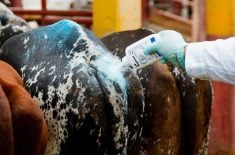Legislation to fix country-of-origin labelling is more likely but far from a sure thing now that the Republican Party is about to control the U.S. Senate, says the National Pork Producers Council.
Republicans took at least 52 seats in the U.S. Senate in last week’s midterm elections Nov. 4. The party could increase its grip on the Senate if runoff elections and recount votes go its way.
Republicans are typically pro-business and pro-trade, but it’s too early to tell if the party’s senators are committed to tackling an issue like COOL, said Dave Warner, the NPPC’s director of communications.
Read Also

Dryness, drought likely to persist says forecaster
As winter approaches, the dry conditions and drought across much of the Canadian Prairies and the United States Plains will likely persist, said Drew Lerner, meteorologist with World Weather Inc. in Overland Park, Kan.
“I would guess the prospects of getting a fix are probably better,” Warner said from his Washington, D.C. office.
“(But) it’s a little premature to make a prediction on that.”
The Canadian Cattlemen’s Association had said before the midterm elections that a shift in power could lead to a legislative solution to COOL because Republicans would assume influential positions in Congress, such as chair of the Senate agriculture committee.
“What it does in Washington is it changes the gatekeepers. It changes the people who get to decide what the Senate works on and what the Congress works on,” John Masswohl, the CCA’s director of government and international relations, said at a town hall meeting in Dauphin, Man. ,in late October.
As expected, the World Trade Organization ruled Oct. 20 that U.S. amendments to its COOL regulations were insufficient. The WTO said the U.S. labelling law still discriminates against exports of live hogs and cattle into the U.S. from Canada and other countries.
The COOL Reform Coalition, which comprises American corporations, industry groups and producer associations, submitted a letter to the U.S. Congress Oct. 30 that urged politicians to deal with COOL before Canada imposes retaliatory tariffs on U.S. products, including pork, beef, wine and juice.
The NPPC was one of 109 groups that signed the letter.
“The United States must avoid trade retaliation,” Warner said.
“We don’t need tariffs on … pork or any other products. That’s going to hurt U.S. jobs and the U.S. economy.”
He said COOL reform is a priority for the U.S. pork industry.
“We will certainly make the case (to Congress) that this is a pretty important issue.”
The U.S. meat industry, commodity groups and agricultural corporations may oppose COOL, but the political calculus is tricky because major U.S. farm organizations support the labelling legislation.
“The list of letter signers included many commodity groups, but it did not include the two largest general farm groups,” said the Hagstrom Report, an agricultural publication in Washington.
The National Farmers Union is a vigorous defender of COOL, and the America Farm Bureau did not sign the letter.
NFU president Roger Johnson said politicians shouldn’t bow to corporate pressure regarding COOL.
“Given the length of the WTO process and the variable outcomes that are possible for COOL, there is no reason for Congress to be stampeded into rash action based on fear mongering,” he said in a statement.
Federal agriculture minister Gerry Ritz has said the government will not rest until “the controversial legislation is scrapped entirely.”
Such an outcome may be unlikely because the WTO didn’t rule that the labelling laws are illegitimate.
“The WTO said the underlying law is fine,” Warner said.
“You can have a label. It’s just that the implementing rules … have been discriminatory to Canadian cattle and pigs and Mexican cattle.”
Warner said the U.S. government may choose to appeal the WTO ruling, but the decision won’t be made until January.















